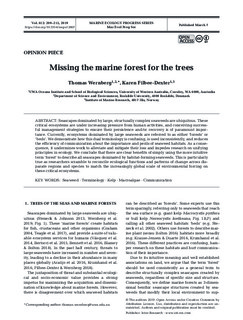| dc.contributor.author | Wernberg, Thomas | |
| dc.contributor.author | Filbee-Dexter, Karen | |
| dc.date.accessioned | 2019-06-18T13:30:36Z | |
| dc.date.available | 2019-06-18T13:30:36Z | |
| dc.date.created | 2019-06-02T19:32:14Z | |
| dc.date.issued | 2019 | |
| dc.identifier.citation | Marine Ecology Progress Series. 2019, 209-215. | nb_NO |
| dc.identifier.issn | 0171-8630 | |
| dc.identifier.uri | http://hdl.handle.net/11250/2601242 | |
| dc.description.abstract | Seascapes dominated by large, structurally complex seaweeds are ubiquitous. These critical ecosystems are under increasing pressure from human activities, and conceiving successful management strategies to ensure their persistence and/or recovery is of paramount importance. Currently, ecosystems dominated by large seaweeds are referred to as either ‘forests’ or ‘beds’. We demonstrate how this dual terminology is confusing, is used inconsistently, and reduces the efficiency of communication about the importance and perils of seaweed habitats. As a consequence, it undermines work to alleviate and mitigate their loss and impedes research on unifying principles in ecology. We conclude that there are clear benefits of simply using the more intuitive term ‘forest’ to describe all seascapes dominated by habitat-forming seaweeds. This is particularly true as researchers scramble to reconcile ecological functions and patterns of change across disparate regions and species to match the increasingly global scale of environmental forcing on these critical ecosystems | nb_NO |
| dc.language.iso | eng | nb_NO |
| dc.title | Missing the marine forest for the trees | nb_NO |
| dc.type | Journal article | nb_NO |
| dc.type | Peer reviewed | nb_NO |
| dc.description.version | publishedVersion | nb_NO |
| dc.source.pagenumber | 209-215 | nb_NO |
| dc.source.journal | Marine Ecology Progress Series | nb_NO |
| dc.identifier.doi | 10.3354/meps12867 | |
| dc.identifier.cristin | 1702142 | |
| cristin.unitcode | 7431,28,0,0 | |
| cristin.unitname | Bunnsamfunn og kystinteraksjon | |
| cristin.ispublished | true | |
| cristin.fulltext | original | |
| cristin.qualitycode | 2 | |
